- Home
- Gavin Chappell
The Londinium File Page 2
The Londinium File Read online
Page 2
He intended to secure himself a cheap place in the slum district of the Argiletum to stable his horse before he bedded down, maybe with a companion for the night. Not that he couldn’t requisition himself a lodging, but it might seem odd that he wasn’t staying at the Camp… Suddenly, something he had seen stopped him dead in his tracks.
He had just been passing the Temple of Janus, on the north side of the Forum, near the entrance to the Argiletum. It was a small temple, having a door at either end, containing only the statue of the two-faced god, one face looking one way, the other looking in the opposite direction. Flaminius always glanced up as he went past, particularly when off on a journey, as if hoping in some superstitious way for the blessing of a god he did not believe in. But to his shock, the face of Janus did not meet his gaze.
The doors of the Temple were shut.
He stood stock still in the middle of the street, ignoring the curses of passers-by, his horse neighing inquiringly. Avidius Pollio’s words came back to him. The emperor…intending to close the Gates of Peace in the Temple of Janus, marking an end to all hostilities within and without the empire…
‘Come along, citizen; you can’t stand here in the middle of the street all evening.’
Flaminius looked up to see a thickset City Guard centurion watching him wearily.
‘You’re getting in the way of the traffic,’ the centurion added. ‘I ought to have you hauled before the magistrate for causing an obstruction. Get your horse and yourself out of the way!’
Flaminius grinned. He showed the irritable centurion his lance-head brooch. It was against regulations to employ his insignia to get himself off criminal charges, but it impressed the centurion, who doffed his helmet and mopped at his brow.
‘Terribly sorry, sir,’ the man said awkwardly. ‘I didn’t know you was a courier. The civilian clothes, y’see. All the same, you’ll have to be moving along now.’ He glanced up at the Temple. ‘I suppose you were surprised, sir,’ he added. ‘Seeing the Gates of Peace shut like that. I’ve never seen the like in all my days. I suppose you haven’t either. You must have been out of town.’
Flaminius started walking, leading his whinnying horse. The centurion strode alongside him, as if escorting him from the scene. A greying, self-important man, clad in civilian dress, with a bulge under one arm that hinted at a concealed weapon like Flaminius’ own, his manner mellowed a little as they walked.
‘Yes, I was a bit surprised,’ Flaminius admitted. ‘I’ve not been in the City for some years. Occupational hazard, you know how it is… Although I heard rumours.’
‘It was the emperor himself, of course,’ said the centurion importantly. ‘I was there on that day. Great fanfare and processions and then the emperor, who’d been away from the City for a long time himself, marched in and had the doors closed. He gave a speech, too, very well spoke he is, even if he does have a… provincial accent. Said that seeing as there was peace within and without the empire, the Gates of Peace were to be shut henceforth.’ The centurion beamed. ‘Isn’t that good to hear, sir? Peace on earth, and it’s the emperor himself who’s brought it about.’
‘Yes, very good to hear,’ said Flaminius, smiling back. ‘Very good news.’
He took his leave of the centurion, and went in search of a bed for the night.
But something didn’t ring true. Oh, Hadrian had shut the Gates of Peace alright. That was indisputable. But if the empire was at peace, if everything was so tranquil, why had Probus sent Flaminius his message? Immediate recall. Extreme urgency…
As Flaminius, deep in thought, led his horse down the Argiletum, he failed to notice the men who dogged his every step.
— 2—
The next morning found Flaminius ascending the street that wound up the Caelian Hill, in a foul mood. A night in the Argiletum had proved a lot less fun than he’d been promising himself. The price of wine in Rome had gone up since last he’d been there, and he could barely afford to get tipsy.
As for finding himself a companion for the night, forget it. The Argiletum had always been an odd mix of the high class and the downright scummy, but the girls had always been friendly, wherever they might come from. Last night he’d got nowhere with several. Was he growing old? It was high time he settled down. But his wasn’t the kind of job that encouraged attachments of that nature. Look what it had done to Medea!
He shied away from that thought, halting in the middle of the quiet street to rub his aching back. As he did, he thought he saw a figure dart back into an alleyway just in the corner of his eye. Turning, he saw no one.
He went to the mouth of the alley: nothing but a cat sniffing suspiciously at some fish bones, who looked up and meowed disapprovingly. Flaminius turned and hurried on his way. He was starting at shadows now! This was where a life of selfless service to the emperor had got him.
He came out on top of the hill and the walls of the Peregrine Camp stood before him, a fortress in the middle of a city, as if ready for attack from hostile street barbarians. It had its name because it was where men from the legions stationed out in the provinces came when they went to Rome. By no means the only military camp in the City or its suburbs, it was a far cry from the Praetorian Camp to the north, but those crenelated walls glowered down at Flaminius as if they meant business. All the same, it was a home from home for him and everyone else in the Commissary, not to mention the imperial couriers.
Flaminius marched up to the front gate and flashed his insignia.
He didn’t recognise either of the two guards, and it became apparent they didn’t recognise him. Both, like the city guard who had accosted him in the Forum, wore civilian dress. Unlike the city guard, both were openly armed, with spears. But Flaminius’ brooch could get him past most obstacles in the City.
‘What’s the password, courier?’ asked the bigger of the two guards, looking down at Flaminius as if he was something nasty that had crawled out from under a flagstone.
‘Vigilance,’ Flaminius hazarded.
The guard laughed humourlessly and shook his head. ‘Bad guess. Get on your way, citizen.’
Flaminius scratched his head. He looked at his brooch, then at the other guard. He appealed to the smaller man.
‘I just showed you my insignia, didn’t I?’ he said. ‘And I’m not a courier, either.’ It was a good hint that he wasn’t the kind to mess with.
The smaller guard shrugged sullenly, and looked to his big friend. The bigger guard lowered his spear and pointed it meaningfully at Flaminius.
‘You gave the wrong password, citizen,’ he drawled. ‘Get moving, and be glad we don’t have you run in for attempting to access imperial property without permission.’
‘No, look here, you don’t understand,’ said Flaminius. ‘I’m here to see the Chief. I’ve been out in Egypt for a few years, and I wasn’t informed as to the most recent change of password.’
Another score against Probus! First the Chief demanded Flaminius’ urgent presence in Rome, then he left him cooling his heels in Portus; now it turned out he had changed the password—not surprising considering how long Flaminius had gone—but not thought to notify a returning agent. Was the Chief losing his mind? Was old age creeping up on the big fool?
‘I’ll go in now, alright?’ said Flaminius, stepping between them.
The bigger guard’s hand shot out and seized him by the folds of his tunic. Flaminius fought to break free. The smaller guard levelled his spear and shouted for help. Several more spearmen rushed out and helped the first guard restrain Flaminius.
‘You want to talk to the Chief?’ hissed the smaller guard, breathing onion-reeking fumes in Flaminius’ face. ‘You’ve just bought yourself a ticket to see him.’
The bigger guard nodded to the other men. Flaminius, angry now, snatched free his right hand and tried to draw his sword, but it became tangled up in his tunic. The bigger guard grabbed his wrist.
‘Easy now, citizen,’ he breathed.
Two men grabbed his arms and
forced them behind his back. The big guard reached a cold hand inside Flaminius’ tunic and yanked out the half drawn sword, snapping the straps that kept it hung under Flaminius’ arm, bringing the sheath with it.
‘Carrying weapons within the sacred precincts of Rome is an offense,’ said the man behind the desk in the Chief’s office. But he wasn’t the Chief. He wasn’t Probus.
‘And so is masquerading as an imperial agent.’ The man rose to his feet, reached over the desk, and tore the brooch from Flaminius’ tunic before the latter had time to react. He dropped it on the desk and picked up a tablet and stylus. ‘Name?’ the man asked without looking up.
‘Julius Caesar,’ said Flaminius levelly, and the man gave him a cold, disbelieving smile. ‘Your men are armed. Aren’t they within the sacred precincts of Rome too?’
The man stared appraisingly at him for a long while. Unabashed, Flaminius stared right back.
This definitely wasn’t Probus. This Chief was a sallow faced man with a neatly trimmed black beard and a lantern jaw. Except for the latter feature, and the crested helmet that sat on the desk, he had more the look of a high ranking clerk than the head of the imperial secret service. He wore a world weary expression as if it had become a habit, and he was giving Flaminius the full benefit of it.
‘The Peregrine Camp lies just outside the pomerium,’ said this new Chief, referring to the invisible boundary that separated the sacred precincts from the rest of the City. ‘We wouldn’t have built a military camp within it, would we?’ Flaminius knew this: he was just playing for time. ‘But my men saw you coming up from the Forum. So you had that sword’—the short sword lay on the desk—‘when you were within the pomerium. Breaking laws that go back to Romulus himself! You should be ashamed of yourself, citizen.’
‘The Praetorian Guard goes armed within the pomerium,’ said Flaminius acerbically.
‘And now you’re issuing calumnies against the emperor’s own bodyguard,’ said the Chief absently, making a new note on the wax tablet. ‘Not looking good, is it? I should have you prosecuted for this. It’ll make the magistrate’s day.’
‘Look, what’s going on?’ Flaminius was furious. ‘I was sent a message by the Chief saying I was needed urgently in Rome. Now I come here to the Commissary headquarters and it’s all changed. Where’s Probus?’
‘Probus?’ said the Chief Centurion. ‘Never heard of him. Commissary? What in Jove’s name are you talking about? This is the central base of the courier service. We don’t deal in commissary matters. You’ve come to the wrong place if you’re a grain commissioner. Try the Horrea Galbae.’
Something was wrong. Something was very definitely wrong. ‘Chief, you know as well as I do that the Commissary has very little to do with grain shipments these days. And the Horrea Galbae are civilian warehouses, not imperial, so I don’t know why you suggest I should go there. The Commissary is…’ He broke off.
‘Yes?’ asked the Chief. ‘I’d be fascinated to know what the Commissary is if it isn’t concerned with grain.’ He genuinely didn’t seem to know what his visitor was talking about.
Flaminius gave up. ‘I can’t discuss it if you’re not in the know,’ he said. ‘But what about Probus? What happened to him? Ask him: he’ll fill you in.’ He shook his head. ‘Believe me, this is not just the imperial courier’s base.’
The Chief looked affronted. ‘Thank you, citizen! I’ll not have some nobody stroll in off the street to tell me my own affairs,’ he said. ‘I am the Chief. I have been the Chief for some time. I know nothing about any Probus. To my certain knowledge my predecessor was called Otho.’
‘May I sit down?’ Flaminius asked palely.
With a magnanimous gesture, the Chief indicated to a scribe that he should bring forth a stool. Flaminius sat down, head in his hands. At the Chief’s command, the scribe poured him a glass of wine. Flaminius sipped it moodily. After taking a moment to collect himself, he looked up.
‘You must be right, Chief Centurion,’ he said. ‘I’ve come to the wrong place. Thank you for your… hospitality.’ He set the empty glass down on the desk and rose to his feet. ‘My humble apologies for any trouble I may have inadvertently caused you. I’ll be going now.’
‘Farewell,’ said the Chief, but when Flaminius reached for his brooch he laid a hand on it.
‘Wait a minute!’ said the big guard, who had been standing in silence in the doorway. ‘This character barges in here waving an illegal weapon and posing as an imperial courier…! And we’re letting him go?’
The Chief’s face flushed an imperial purple. ‘Enough!’ he barked. ‘You’re on a charge, soldier! Take him away.’
Some of the other guards led the bigger one from the office while two more remained behind to provide an escort for Flaminius. Weaponless, stripped of the insignia that marked him as an imperial agent, he allowed himself to be marched out of the fortress building, across the small parade ground, past the temple of Jupiter, and out into the street where they left him.
For a long time he stood there on the pavement, looking back at the camp incredulously. At last, shaking his head, he turned and walked away down the hill.
A few minutes later he had reached the Colosseum. There was no show today, and besides, he’d lost all interest in gladiatorial display in recent years. He walked dispiritedly past the massive structure. Whores cooed invitingly from the lower arches, offering their sultry wares, but for once in a way they held no interest for him.
Rounding the corner he saw the Colossus of Nero towering over everything. The titanic statue showed the former emperor naked but for the sun god’s crown on his head, holding a rudder in one hand over a representation of the globe of the world to show his dominion over the universe. And now his successor, Hadrian, had declared peace on earth. The dream of all emperors had come true. Peace within and without the empire.
But there was no comparable peace within Flaminius’ breast as he walked aimlessly in the direction of the Forum. The Palatine Hill reared on one side, the palaces of the emperors gazing down smugly at the teeming crowds below, the massive abutments of the House of Tiberius towering over everything. In the distance he could see Trajan’s Column, another memorial of Roman triumph.
The Forum was very busy, but Flaminius himself was at a loose end. It seemed he was out of a job. Homeless, too, if they wouldn’t provide him with a bunk at the Peregrine Camp. He jingled his money belt surreptitiously, then slunk into a shaded corner by the Basilica Julia to count his ready cash. Enough to get him another night’s rest at the Argiletum’s exorbitant prices, no more. Maybe he could find a cheaper fleapit in the Subura. He could certainly do with a drink.
He drifted aimlessly across the Forum, thinking about going home. Back to his father’s villa up in the hills. It was so long since he’d gone back there. He’d written frequently to the family when he began his service with the Eagles, even returned a few times when on leave, for Saturnalia at least. But since joining the Commissary, his letters had been fewer and fewer, and his visits had soon ended. It was hard to square the work he did with family life, just as he could see no future in settling down with a nice girl, even a camp follower. But it was over now.
He pictured his father’s disappointed face when he turned up with a tale of an aborted career. Something he could barely speak about. His father was a Roman of the oldest of old schools, who liked to believe his obscure equestrian family was descended from the consul Gaius Flaminius who had fought against Hannibal, and he had no time for the legions of today.
‘My advice to you, son,’ his father had droned the last time they’d met, ‘is get out of the military as soon as you can and get into farming. Look around here. Not a big place, and it’s a long way from Rome or anywhere else. But we support ourselves and our slaves, and still have a surplus to trade at market.’
The pastoral idyll had not appealed to Flaminius. It still didn’t. But what else did he have?
He dodged out of the way of a rose-pink litter borne
at speed by two burly Celts. A waft of perfume—rhodinum[2], if Flaminius’ expert nose was right—billowed from an open curtain. He caught a glimpse of a voluptuous woman wearing heavy makeup, her arm raised. Then something clattered on the ground beside him, the curtain fell back into place, and the litter vanished into the unfathomable depths of the Forum crowd.
Curious, Flaminius knelt down to pick up whatever she had dropped. It was a rectangle of pottery. On it was scratched an inscription: Circ. Max. Seat XXXXVIII: Row VIII. And today’s date.
It was a ticket for the Circus Maximus.
— 3—
‘So, do you come here often?’ said Flaminius. ‘As the, er, vestal virgin said to the pontifex maximus.’
His grizzled neighbour’s dour reply went unheard. A roar rose from the circus crowd as this new man Diocles screeched round the bend, his four horse chariot—representing the Whites—in the lead for the final lap.
On reading the inscription on the ticket, Flaminius had looked around in puzzlement, but the rose pink litter had vanished from the Forum, leaving only a heady suggestion of Babylonian gardens in its wake. He had glanced back down at the inscription. The games would soon be starting. With this ticket, he would be able to get himself a shaded seat, hobnobbing with the rich, not loafing down in the free seats favoured by the plebeians. Given the diminishing nature of his ready money, and his recent unexpected redundancy, this would be an undoubted boon.
And why not? What else did he have to do, in the name of Pluto? So Flaminius went to the Circus.
After some searching he found his place. Already the seats of the great stadium were packed. He wasn’t sure what festival was being celebrated that day, there were so many, after all, but he doubted that anyone else was concentrating on the religious significance of it all as they gazed down from the rows of stone seats that flanked the race track. Trajan of Blessed Memory rebuilt the circus in stone when Flaminius was but a babe in arms, and he could barely picture the rickety structure that his father had complained of. The stone was weathered in places, but it was almost as old as Flaminius, so he could hardly complain.

 The Hadrian Legacy
The Hadrian Legacy On Hadrian's Secret Service
On Hadrian's Secret Service Murder in Hadrian's Villa
Murder in Hadrian's Villa The Sword of Wayland
The Sword of Wayland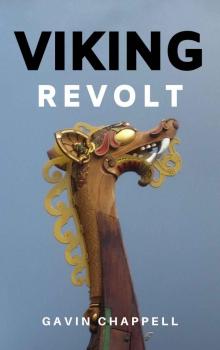 Viking Revolt
Viking Revolt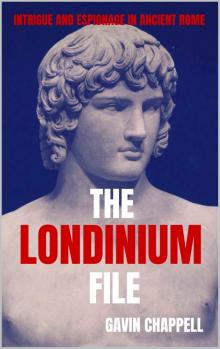 The Londinium File
The Londinium File The Gladiator Gambit
The Gladiator Gambit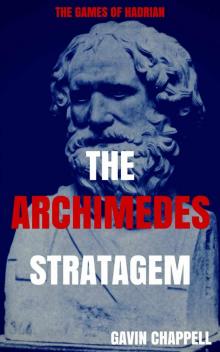 The Archimedes Stratagem
The Archimedes Stratagem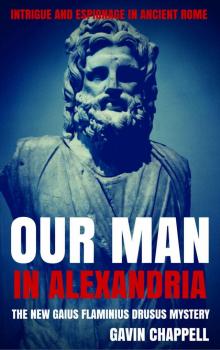 Our Man in Alexandria
Our Man in Alexandria Into the Void (The Dungeoneers)
Into the Void (The Dungeoneers) The Kingdom That Rome Forgot
The Kingdom That Rome Forgot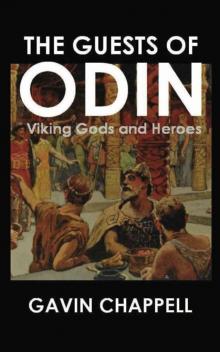 The Guests of Odin
The Guests of Odin